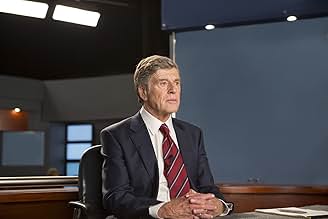Il servizio militare dell'allora presidente George W. Bush e la successiva tempesta di critiche che ha costato a Dan Rather e al produttore Mary Mapes le loro carriere.Il servizio militare dell'allora presidente George W. Bush e la successiva tempesta di critiche che ha costato a Dan Rather e al produttore Mary Mapes le loro carriere.Il servizio militare dell'allora presidente George W. Bush e la successiva tempesta di critiche che ha costato a Dan Rather e al produttore Mary Mapes le loro carriere.
- Regia
- Sceneggiatura
- Star
- Premi
- 1 vittoria e 6 candidature totali
Recensioni in evidenza
"Truth" tells an intense story, and it captivates my attention throughout. Mary is passionate about her work, and yet she stumbles upon the wrong story to report. I feel so sorry for her and her colleagues for having worked on such an explosive story, that would backfire on them no matter whether the documents were true or not. Mary is right in saying that when the noise is so loud, people forget what the original purpose is about. That is the one sad truth highlighted in this fascinating and engrossing story.
Dan Rather: Curiosity. Why'd you get into it?
Mike Smith: You.
These three simple lines cut right to the heart of Truth, the new movie from established writer and first time director James Vanderbilt (Zodiac, The Amazing Spider-Man). The news used to consist of hard hitting investigative journalism, a public service that would expose relevant stories to shed light on the true condition of a deceptive world. Now, instead of covering stories like The Watergate Scandal or what was really happening in Vietnam, newscasters have become mouthpieces. They have become the personalities on TV who we look to for a recap of what happened last night on American Idol or what President Obama had for breakfast this morning. Truth attempts to shed light on the corruption of investigative journalism by corporate greed and political agendas which make it impossible for respected newscasters and their producers to do their jobs, and in so doing it shows us a dangerous future of smoke and mirrors that is already taking hold. Despite some of the film's minor faults, Truth is a beautiful and moving Requiem for The News.
When a scandal does come along that could rock the foundation of American politics, such as the surfacing of the so-called Killian Documents, there are factions that will try to kill the story no matter how much evidence of proof exists. This is the story of Truth, based on the book written by...
Check out the full review on David 'n the Dark! https://davidnthedark.wordpress.com/2015/10/25/a-requiem-for-the- news/
There are multiple messages the film tries to get across. One could be that people in positions of power can get away with certain things pretty easily. Another is that people can take advantage of the chaos that ensues after the outcry of a loud minority on the internet, with the help of other media outlets, to distract from the main story. The main theme, I would say, is that bullies come in all forms, and can be highly destructive.
I think that the film-makers wanted to elicit from their audience opinions about power imbalance and accountability, and maybe even sensationalism. Clearly the other news agencies depicted in the movie were guilty of sensationalist behavior. Perhaps the writers and directors and actors wanted to simply tell a true story about a brilliant journalist who had to struggle very hard to combat the gravity of hyped up nonsense. It was an insult to Mapes' professionalism to have to deal with lame bloggers who weren't accountable to anything (assuming this is even true). Maybe that's the movie's biggest flaw. I don't know what it wanted me to believe. I'm not going to think that Mapes and Rather were innocent just because Quaid whispered a cliché monologue about why they're so compatible with each other (the plane scene).
An original draft of this review had me ranting about the political landscape of 2005. I (sort of?) learned about an important part of American media history. But the focus of the film kept changing. Some themes would come and go while others would resurface in little intervals (three to be exact). For example, the movie started out strong, with high hopes about evidence of the scandal being strong and hard hitting. Then quickly the plot takes a 90-degree turn, and now we're watching Mapes struggling to resolve one measly discrepancy that's grabbing all the media attention. After that disaster subsides, we begin watching a movie about a corporate investigation into false journalism. The storytelling was incoherent, finding myself with unanswered questions as the next big event came.
Most of my questions regarded the documents. The technical military jargon in the dialogue was difficult to follow, adding to the confusion. I found myself repeatedly asking: "who's that guy? Why is he mentioned all of the sudden? John Kerry was a thing back then?" That last question speaks to my ignorance, but still, the dialogue was clunky.
If you watch the film conscious of the underlying theme, it'll be less painful. The theme whose undertones influences all of Mapes' actions is her relationship with her abusive father. She admits at one point that he's the reason she needs to stand up to bullies. And in each of the three stages described above, that is precisely her motivation. First, she "asks questions" about a possibly incriminating aspect of Bush Jr's military history. But what happens? The bully strikes her down. She fights back by proving that the stupid discrepancy wasn't a problem after all. All is good, except now everyone forgot what the story was about. The bully returns with an investigation into her conduct. She didn't do anything inherently wrong (she makes some mistakes though), but she's treated with a disproportionate level of scrutiny. Meanwhile, a man who possibly went AWOL during wartime is winning a presidential election.
When you go to watch the movie, perceive it as a series of acts, like in a play. Act one, the scandal gets out. Act two, the haters launch their attack. Act three, the investigation. On a road which begins with covering the news, and ends with covering your butt, one thing holds; bullies suck.
I'm not watching it again, C grade
Check out our other reviews at http://thefilmlawyers.wordpress.com
In 2004, Mary Mapes brought in her team to dig into the rumors that President George W Bush had received preferential treatment in military assignments and that his military service records were either incomplete, had been altered, or proved that he did not fulfill his service requirements. Ms. Mapes professional relationship with Dan Rather allowed her to bring him into the fold, and resulted in significant air time on CBS and "60 Minutes". Most of us know how this saga ended Mapes and her team were let go, and Mr. Rather's time as the network news anchor was unceremoniously ended. While there may very well be substance to the story they were chasing, both the book and the movie act as Ms. Mapes defensive pleas of innocence.
In the film, Cate Blanchett plays Mary Mapes, and Robert Redford plays Dan Rather. Ms. Blanchett, as usual, is exceptional; and Redford is solid in capturing the essence of Rather (though the hair color variances are distracting). The other key players are: Topher Grace as reporter Mike Smith, Dennis Quaid as researcher and former Marine Lt. Colonel Roger Charles, Elisabeth Moss as Lucy Scott, Bruce Greenwood as Andrew Heyward (President of CBS News), Stacy Keach as Mapes source Lt. Colonel Bill Burkett, and Dermot Mulroney as CBS attorney Lawrence Lampher. The film is well cast, but it's not enough to make up for the weak script and the less-than-stellar direction from first timer James Vanderbilt (who did write the screenplay for Zodiac, and is the great-grandson of Albert G Vanderbilt).
Rather than provide any proof that the story was properly documented and confirmed, Mapes and Rather decry the loss of reporters who ask the "tough" questions. Their defense seems to be that they were brave enough to chase the story and ask questions. A sequence is included that positions these two as the last bastions for true news reporting, and that these days news organizations are more concerned with profits and ratings, than breaking a story. This argument conveniently omits the fact that information flows much more freely today than in "the good old days". The actions of politicians and industry leaders are constantly being questioned and scrutinized by the endless stream of bloggers and reporters – both amateurs and professionals. There is no shortage of questions being asked, and the ease with which accusations are leveled actually fits right in with the Mapes approach.
The frustrating part of the movie is that it's a missed opportunity to detail how "legitimate" news organizations go to extremes to document and verify their information and sources, and this is where Ms. Mapes' team fell short. Without intending to, the film plays more similar to Shattered Glass (2003) than All the President's Men (1976) getting a story being more important than proving a story. We are left with the feeling that Ms. Mapes believes asking a question is more important than proving the facts. The cringe-inducing shot of Dan Rather's final broadcast leaves the viewers with the impression that the objective of the film was to place Mapes and Rather on a pedestal of righteousness. The only thing actually confirmed here is that heads rolling at CBS was the right (and only reasonable) call.
Lo sapevi?
- QuizThe movie was shot in Australia at Cate Blanchett's request, as she wanted to be close to her family while filming.
- BlooperThe movie timeline shows June 2004 and Mary Mapes is meeting with Josh Howard and Mary Murphy. She describes Bill White as a "business man" in Houston. Bill White was the MAYOR of Houston. (as of January 2004.)
- Citazioni
Mary Mapes: Do you know what it would take to fake these memos?
Dick Hibey: Mary...
Mary Mapes: No, this is important. It would require the forger to have an in-depth knowledge of the 1971 Air Force manual, including rules and regulations and abbreviations. He would have to know Bush's official record front to back to make sure none of these memos conflicted with it. He would have to know all of the players in the Texas Air National Guard at the time, not just their names, but their attitudes, their opinions including how they related to one another. He would have to know that Colonel Killian kept personal memos like this for himself in the first place. He would have to know how Killian felt at the time particularly about his superiors and then First Lieutenant Bush. He would have to know or learn all of this in order to fool us as you assume he did. Now... Do you really think that a man who takes this kind of time and precision, then goes and types these up on Microsoft Word?
[Small pause]
Mary Mapes: Our story was about whether Bush fulfilled his service. Nobody wants to talk about that. They wanna talk about fonts and forgeries and conspiracy theories, because that's what people do these days if they don't like a story. They point and scream. They question your politics, your objectivity, hell, your basic humanity. And they hope to God the truth gets lost in the scrum. And when it is finally over and they have kicked and shouted so loud, we can't even remember what the point was.
- Curiosità sui creditiWilliam Devane as the voice of Gen. Hodges on the telephone is not listed in the cast.
- ConnessioniFeatured in Close Up with the Hollywood Reporter: Actresses (2016)
- Colonne sonoreString Quartet #1 - Allegro Assai
Written by Wolfgang Amadeus Mozart (as Wolfgang Mozart)
Courtesy of APM Music
I più visti
- How long is Truth?Powered by Alexa
Dettagli
- Data di uscita
- Paesi di origine
- Siti ufficiali
- Lingua
- Celebre anche come
- Conspiración y poder
- Luoghi delle riprese
- Aziende produttrici
- Vedi altri crediti dell’azienda su IMDbPro
Botteghino
- Budget
- 9.600.000 USD (previsto)
- Lordo Stati Uniti e Canada
- 2.541.854 USD
- Fine settimana di apertura Stati Uniti e Canada
- 66.232 USD
- 18 ott 2015
- Lordo in tutto il mondo
- 5.383.097 USD
- Tempo di esecuzione2 ore 5 minuti
- Colore
- Mix di suoni
- Proporzioni
- 2.39 : 1
Contribuisci a questa pagina











































